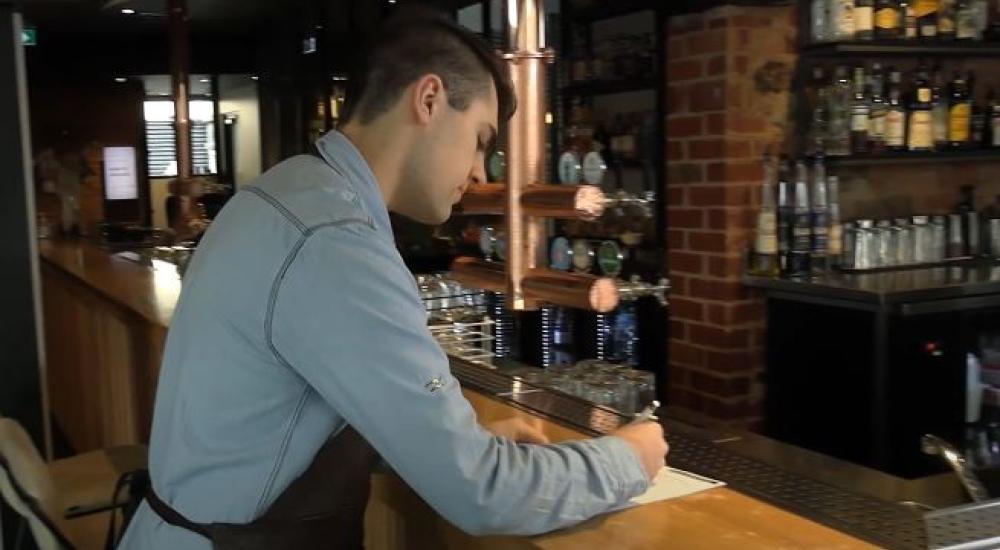
Consumer and Business Services (CBS) has issued new barring order forms, together with an instruction video, to assist licensees when issuing barring orders under s125 of the Liquor Licensing Act 1997.
The video sets out the different types of barring orders that may apply and the circumstances and time frames that licensees and staff should be aware of when barring a person from their venue. CBS recommends viewing the video in a training session with staff or incorporating into a training manual.
[A woman and man sit facing the camera in front of a pub-bar.]
Zoe: Hi I'm Zoe and I work in liquor licensing at Consumer and Business Services.
Didier: And I'm Didier from the Australian Hotels Association.
Zoe: Today we're going to talk through the new forms that CBS has introduced for licensees when they wish to bar someone from their premises. Under the Liquor Licensing Act a licensee or responsible person (rp) may bar someone from their premises if the person has committed an offence behaved in an offensive or disorderly manner or on any other reasonable ground. A patron can also be barred on welfare grounds, but we'll touch on that later.
[Imagery of the form]
We recently reviewed our barring forms to improve the layout and create an additional section to be completed if a licensee wishes to apply to CBS to bar someone for more than the maximum period that would otherwise apply. Let's start with the basics.
Didier, for how long can a patron be barred from a venue on misconduct grounds?
[Text appears on screen. Barring time allowed for misconduct:
Up to 3 months for first barring
Up to 6 months for second barring
Indefinite or other time, if already barred twice from the same venue.]
Didier: Thanks Zoe. For barring on misconduct grounds you can bar someone for, up to three months for a first barring, up to six months for a second barring and for an indefinite period or other specified period if they've already been barred twice previously from that venue. However, if the conduct is so serious that you want to bar someone for a longer period on the first or second barring then you will need the Commissioner's approval.
[A woman and man sit facing the camera in front of a pub-bar.]
Zoe: That's right Didier and that's where our new form should guide you in this process.
The new form has an optional section at the back which a licensee needs to complete if they are seeking approval to bar someone for more than the three or six month maximum. It's important to note the optional section only needs to be filled out if the licensee wishes to bar someone for an extended period. If the three or six months is appropriate, just fill out the barring order as normal and ignore the optional section. Didier, let's run through an example.
Didier: Sure Zoe.
Let's say Tom's the rp here at the Strathmore Hotel and he gets a glass thrown at him by patron Jim when he's refused any more service. This is certainly grounds for a barring order.
Jim has never been barred from this pub before so the maximum Tom can bar him for is three months. Tom thinks the misconduct is so serious that he wants to bar Jim for 12 months. What does Tom need to do Zoe?
[Imagery of the form]
Zoe: So Tom can fill out the barring order for three months and serve it on Jim. This would ensure that Jim is barred from entering or remaining on the premises at the Strathmore Hotel for three months. At this point Tom has no legal authority to bar Jim for longer than three months because this is his first barring.
[Barman walks towards the bar holding the paperwork and begins to complete it resting on the bar top with a pen.]
Zoe: Once the barring order has been served on Jim, Tom needs to complete the optional section and request an extended period of 12 months from CBS. Tom needs to outline in the form why he thinks 12 months should be imposed.
[A woman and man sit facing the camera in front of a pub-bar.]
Didier: So just to clarify Zoe, if Tom serves the barring order on Jim on the spot does the optional section need to be filled in and served on Jim as well?
Zoe: No it can be sent to CBS later with a copy of the original barring order. If the barred person is not served on the spot, the entire form including the optional section can be completed as one and served on the barred person and CBS later. CBS will consider whether the extended period should be approved and will contact Jim to seek his views. CBS will notify both parties of the Commissioner's decision. So if the Commissioner agreed that 12 months was appropriate Jim would be notified that he's barred from the hotel for 12 months. If the Commissioner thought 12 months was excessive, Jim would still be barred for three months. If Jim is unhappy about being barred, whatever the period, as long as it's more than 28 days he can seek a review of the barring. It's important to note that Jim's right of review is not affected by Tom seeking an extended period.
Didier: So what happens if Tom applies for the extended period but CBS can't get in contact with Jim?
Zoe: That's a great question. We certainly appreciate that finding out someone's contact details in the context of a barring can be difficult for licensees. Sometimes those details come to light when the dust settles and the barred person is not happy with being barred. Police can assist in providing information to licensees or rp's to help identify the person before or after a barring order is served. CBS would make every effort to contact the barred person when considering an extended period but if that's not possible a decision would still be made and the venue notified of the outcome. If the extended period is approved the licensee may be able to serve the barred person with this outcome at a later time if they return to the venue. Police may also be able to assist CBS to notify the barred person of the outcome.
Didier: Okay thank you for that. So when does the licensee need to provide a barring order to CBS?
Zoe: In two instances. So first, a barring order must be provided to CBS within seven days of service for any barring longer than six months.
[Text appears on screen. Barring orders need to be provided to CBS when: Barring orders are longer than 6 months (to be provided within 7 days of being served)
When seeking approval for an extended period (provide the original order and the optional section).]
The barring order ceases to have effect if this is not done And secondly if a licensee is seeking approval for an extended period, as we've discussed today, they would provide CBS with a copy of the original barring order, including the optional section.
Didier: Thanks Zoe and our tip for licensed venues is do not give the original order to the patron without photocopying the form first.
[Barman taking a photo with his phone of the completed order.]
This can be as simple as taking a photo of the order, before serving it on the patron. Just make sure it's a clear photo.
Zoe: That's a great tip. Now let's talk about welfare barrings. Didier, could you take us through the grounds for a welfare barring?
[A woman and man sit facing the camera in front of a pub-bar.]
Didier: Certainly. So a person can be barred if there are welfare concerns for that person, their family or someone living with them that relates to the consumption of alcohol. I understand there's some now separate forms for welfare barrings.
Zoe: That's correct. Given that welfare barrings by licensees are less common, and they operate differently, we've created a separate form for barring someone on welfare grounds.
[Text on screen. Welfare barring orders:
Can be indefinite or any period from first barring
Commissioner's approval for time barred not needed
If longer than six months, provide a copy of the order to the commissioner within seven days.]
As the form indicates, a person barred on welfare grounds may be barred for an indefinite period or any specified period from the first barring.
There's no need to seek the Commissioner's approval for the period imposed, so there's no optional section in this form. If the person is barred for more than six months the licensee must still provide a copy of the barring order to the Commissioner within seven days.
[A woman and man sit facing the camera in front of a pub-bar.]
Didier: So deciding whether to impose a welfare barring can be a complex and sensitive situation to navigate so don't hesitate to contact CBS or your industry representative for further guidance.
Zoe: Thanks Didier. So we hope that these forms will provide a clearer process for licensees and rp's when they need to issue a barring. But if you do encounter any issues or you wish to provide feedback please contact us, either through your industry rep, or by emailing: liquorandgaming@sa.gov.au
The new forms will also be made available on the CBS website.
Thanks for watching. Thanks!
[Text on screen: www.cbs.sa.gov.au/liquor-gambling-lotteries]
Importantly, as the video explains, there is now a separate (optional) section to complete where a licensee wishes to seek the Liquor and Gambling Commissioner’s approval to bar someone for a period longer than would otherwise apply. See below for further details.
Barring a patron on misconduct grounds
For misconduct related barring orders, you may bar a person for:
- up to three months for a first barring;
- up to six months for a second barring; and
- for an indefinite period or other specified period if barred twice previously from that venue.
Licensees may apply to the Liquor and Gambling Commissioner to approve a longer barring period where they feel the conduct is serious enough to warrant a longer barring. This application is a separate step undertaken following the issuing of the initial barring notice.
The new barring form sets out the process that must be followed.
Applying for a longer barring period
The new form includes a detachable ‘Extended barring period request’ section which can be completed and returned to CBS within 7 days with a copy of the barring order imposed. CBS will consider the request, seek the views of the barred person where possible, and notify the parties of the outcome.
Welfare barrings
A person barred on welfare grounds under s125(1)(aa) of the Liquor Licensing Act 1997 may be barred for an indefinite period or any specified period. A separate form is now available for barrings on welfare grounds.
Notifying CBS of barrings
You must submit a copy of the barring form (whether it was made on welfare or misconduct grounds) to CBS within 7 days if the barring is for longer than 6 months.
Barring forms should be completed and returned to CBS via:
- email: liquorandgaming@sa.gov.au
- post: Liquor and Gaming, GPO Box 2169, ADELAIDE SA 5001
- in person: CBS Customer Service Centre, 95 Grenfell Street, ADELAIDE SA 5000 (enter from Chesser Street)
Barring forms and further information is available at: www.sa.gov.au/topics/business-and-trade/liquor/running-a-licensed-venue/barrings
More information
For further information about the barring process and to access the forms please:
- visit SA.GOV.AU
- contact the licensing team on ph 131 882
- email: liquorandgaming@sa.gov.au


